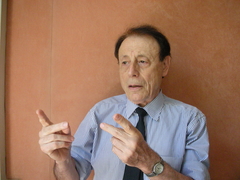Related Research Articles
Brainwashing, also known as mind control, menticide, coercive persuasion, thought control, thought reform, and forced re-education, is the concept that the human mind can be altered or controlled by certain psychological techniques. Brainwashing is said to reduce its subject's ability to think critically or independently, to allow the introduction of new, unwanted thoughts and ideas into their minds, as well as to change their attitudes, values, and beliefs.

Negotiation is a dialogue between two or more parties to resolve points of difference, gain an advantage for an individual or collective, or craft outcomes to satisfy various interests. The parties aspire to agree on matters of mutual interest. The agreement can be beneficial for all or some of the parties involved. The negotiators should establish their own needs and wants while also seeking to understand the wants and needs of others involved to increase their chances of closing deals, avoiding conflicts, forming relationships with other parties, or maximizing mutual gains. Distributive negotiations, or compromises, are conducted by putting forward a position and making concessions to achieve an agreement. The degree to which the negotiating parties trust each other to implement the negotiated solution is a major factor in determining the success of a negotiation.
The term large-group awareness training (LGAT) refers to activities - usually offered by groups with links to the human potential movement - which claim to increase self-awareness and to bring about desirable transformations in individuals' personal lives. LGATs are unconventional; they often take place over several days, and may compromise participants' mental wellbeing.
In negotiation theory, the best alternative to a negotiated agreement or BATNA refers to the most advantageous alternative course of action a party can take if negotiations fail and an agreement cannot be reached. The BATNA could include diverse situations, such as suspension of negotiations, transition to another negotiating partner, appeal to the court's ruling, the execution of strikes, and the formation of other forms of alliances. BATNA is the key focus and the driving force behind a successful negotiator. A party should generally not accept a worse resolution than its BATNA. Care should be taken, however, to ensure that deals are accurately valued, taking into account all considerations, such as relationship value, time value of money and the likelihood that the other party will live up to their side of the bargain. These other considerations are often difficult to value since they are frequently based on uncertain or qualitative considerations rather than easily measurable and quantifiable factors.

Interrogation is interviewing as commonly employed by law enforcement officers, military personnel, intelligence agencies, organized crime syndicates, and terrorist organizations with the goal of eliciting useful information, particularly information related to suspected crime. Interrogation may involve a diverse array of techniques, ranging from developing a rapport with the subject to torture.

Mutt and Jeff is a long-running and widely popular American newspaper comic strip created by cartoonist Bud Fisher in 1907 about "two mismatched tinhorns". It is commonly regarded as the first daily comic strip. The concept of a newspaper strip featuring recurring characters in multiple panels on a six-day-a-week schedule had previously been pioneered through the short-lived A. Piker Clerk by Clare Briggs, but it was Mutt and Jeff as the first successful daily comic strip that staked out the direction of the future trend.
The Reid technique is a method of interrogation. The system was developed in the United States by John E. Reid in the 1950s. Reid was a polygraph expert and former Chicago police officer. The technique is known for creating a high pressure environment for the interviewee, followed by sympathy and offers of understanding and help, but only if a confession is forthcoming. Since its spread in the 1970s, it has been widely utilized by police departments in the United States.

Prince of the City is a 1981 American epic neo-noir crime drama film directed by Sidney Lumet. It is based on the life of Robert Leuci, called ‘Daniel Ciello’ in the film, an officer of the New York Police Department who chooses, for idealistic reasons, to expose corruption in the force. The screenplay, written by Lumet and Jay Presson Allen, is based on a 1978 non-fiction book of the same title, by former NYPD Deputy Commissioner Robert Daley.

Massive retaliation, also known as a massive response or massive deterrence, is a military doctrine and nuclear strategy in which a state commits itself to retaliate in much greater force in the event of an attack.
Abed Hamed Mowhoush was an air vice-marshal believed to be in command of the transport, logistics and airlifting division of the Iraqi Air Force during the regime of Saddam Hussein immediately prior to the 2003 Invasion of Iraq, until his surrender to United States forces on 10 November 2003. He died on 26 November 2003 while in U.S. custody at the Al-Qaim detention facility approximately 200 miles (320 km) northwest of Baghdad, following a 16-day period of detention.
The Mutual Gains Approach (MGA) to negotiation is a process model, based on experimental findings and hundreds of real-world cases, that lays out four steps for negotiating better outcomes while protecting relationships and reputation. A central tenet of the model, and the robust theory that underlies it, is that a vast majority of negotiations in the real world involve parties who have more than one goal or concern in mind and more than one issue that can be addressed in the agreement they reach. The model allows parties to improve their chances of creating an agreement superior to existing alternatives.
Rhetorical stance refers to the deliberate choices made by a communicator in shaping and presenting their message. It encompasses the strategic decisions regarding language, style, and tone that are employed to achieve a specific communicative purpose. This concept is deeply rooted in rhetorical theory and is a fundamental aspect of effective communication across various disciplines, including literature, public speaking, and academic writing.

Lawrence E. Susskind is a teacher, trainer, mediator, and urban planner. He is one of the founders of the field of public dispute mediation and is a practicing international mediator through the Consensus Building institute. He has taught at the Massachusetts Institute of Technology since 1971.
Multiple Equivalent Simultaneous Offers (MESO) is a technique used in negotiations. The principle behind MESO is to make multiple offers that are mutually equal in one's mind. By doing this, one can better understand one's partner in a negotiation—his or her interests, expectations, etc.

The United Nations Climate Change Conferences are yearly conferences held in the framework of the United Nations Framework Convention on Climate Change (UNFCCC). They serve as the formal meeting of the UNFCCC parties – the Conference of the Parties (COP) – to assess progress in dealing with climate change, and beginning in the mid-1990s, to negotiate the Kyoto Protocol to establish legally binding obligations for developed countries to reduce their greenhouse gas emissions. Starting in 2005 the conferences have also served as the "Conference of the Parties Serving as the Meeting of Parties to the Kyoto Protocol" (CMP); also parties to the convention that are not parties to the protocol can participate in protocol-related meetings as observers. From 2011 to 2015 the meetings were used to negotiate the Paris Agreement as part of the Durban platform, which created a general path towards climate action. Any final text of a COP must be agreed by consensus.

"Good Cop, Bad Cop" is the fourth episode of the seventh season of the American police procedural drama NCIS, and the 142nd episode overall. It originally aired on CBS in the United States on October 13, 2009. The episode is written by David North and Jesse Stern and directed by Leslie Libman, it received generally positive reviews and was seen live by 21.04 million viewers.

Guy Olivier Faure is a professor of International Negotiation. He is currently president of the Brussels Diplomatic School (ULB/CERIS).

David Lax is an American negotiation expert, author, speaker, statistician and academic. He is currently a Distinguished Fellow at the Harvard Negotiation Project, Managing Principal of Lax Sebenius LLC, a firm that advises companies and governments in challenging and complex negotiations, and a former professor at Harvard Business School.
The PEACE method of investigative interviewing is a five stage process in which investigators try to build rapport and allow a criminal suspect to provide their account of events uninterrupted, before presenting the suspect with any evidence of inconsistencies or contradictions. It is used to obtain a full account of events from a suspect rather than just seeking a confession - which is the goal of the Reid technique, in which interrogators are more aggressive, accusatory, and threatening in terms of proposing consequences for the suspect's failure to confess to the crime.
References
- ↑ The Phrase Finder. "Mutt and Jeff"
- ↑ Susan Brodt; Marla Tuchinsky (March 2000). "Working Together but in Opposition: An Examination of the "Good-Cop/Bad-Cop" Negotiating Team Tactic". Organizational Behavior and Human Decision Processes. 81 (2): 155–177. doi:10.1006/obhd.1999.2879. PMID 10706812.
- ↑ Shonk, Katie (January 7, 2020). "The Good Cop, Bad Cop Negotiation Strategy". Harvard University. Archived from the original on March 18, 2019. Retrieved June 10, 2021.
- ↑ "Human Resource Exploitation Training Manual" (PDF). Central Intelligence Agency. 1983. pp. 26–27. Archived (PDF) from the original on August 25, 2017. Retrieved June 10, 2021.
- ↑ Mark Homan (2010). Promoting Community Change: Making it Happen in the Real World. Cengage Learning. p. 389. ISBN 978-0840031952 . Retrieved 24 January 2015.
- 1 2 Lewicki, Roy J.; Hiam, Alexander (2011). Mastering Business Negotiation: A Working Guide to Making Deals and Resolving Conflict. San Francisco: Jossey-Bass. p. 114. ISBN 9781118046944 . Retrieved February 4, 2023.
- ↑ Lewicki, Roy J.; Hiam, Alexander (2011). Mastering Business Negotiation: A Working Guide to Making Deals and Resolving Conflict. San Francisco: Jossey-Bass. p. 115. ISBN 9781118046944 . Retrieved February 4, 2023.